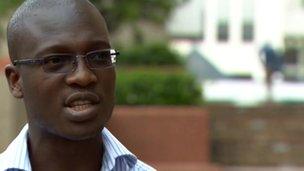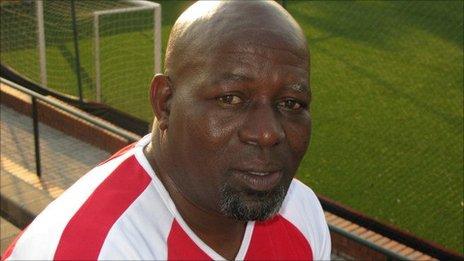South Africa crippled by rape culture
- Published
- comments
South Africa numbed by rape 'epidemic'
The 22 year old was still sitting inside the makeshift bar in Soweto, when the police came for him. It was a few days before new year.
According to witnesses, the man had just attacked and raped a 17-year-old girl at his table, but apparently considered the incident so trivial that he had not even tried to flee.
Nor had anyone else in the bar, besides the alleged victim, thought of contacting the police.
At a time when Indians are re-examining their society in the light of a single, horrific incident of gang rape, South Africa seems numb - unable to muster much more than a collective shrug in the face of almost unbelievably grim statistics - seemingly far worse than India's.
Here almost 60,000 rapes are reported to the police each year - more than double the number in India, in a far smaller country.
Experts believe the true figure is at least 10 times that - 600,000 attacks
It is not that the issue is ignored - far from it.
This week South African newspapers are carrying gruesome stories of what is being described as a new trend - the rape of elderly grandmothers, mostly in rural communities; an 82 year old and a 73 year old attacked on 2 January.
But despite the anger voiced by columnists, and by people calling in to radio stations, there is no sense of a nation being galvanised.
In recent days commentators and campaigners here have looked, almost enviously, towards India, wondering what it might take to provoke a similar sense of outrage - and angrily debating whether outrage itself is enough, and who, or what, to blame.
History, perhaps, or drugs, or poverty…
"No-one can tell me that raping a three-month-old baby or 87-year-old granny or burning a library or vandalising a school is caused by poverty," said trade union federation leader Zwelenzima Vavi, in a recent Tweet exchange, external.
"Rape is in our culture. It's part of the whole patriarchal culture," businesswoman and activist Andy Kawa, who was herself the victim of a gang rape, told me.
"It's an every day thing. It happens in homes. There's silence because of fear, because the perpetrator, most of the time, has the power," she said.
'Plenty of rapists here'

Editor Mpumelelo Mkhabela says the people need to do more to fight rape
Mpumelelo Mkhabela, editor of the Sowetan newspaper, said: "The government is doing its best but we also need citizens to take up the fight and take up the campaign instead of being outraged for a moment, only to stop a few days later."
Perhaps the only certainty is that South Africa is a violent society.
It has been so for decades, and people have got used to it.
In many communities young women talk of how they almost expect to be assaulted - and young men grow up with a dangerous sense of entitlement.
So this week there was barely any public reaction, beyond a few brief headlines, when news came in of a 21-year-old woman who was gang-raped on Tuesday on her way to try to enrol at a university outside Pretoria.
She was dragged into the bushes by four as yet unidentified men. She survived the attack.
Outside the university gates the next day, I spoke to some of her fellow students.
Most had not heard about the attack, and none seemed remotely surprised.
They were more preoccupied with keeping their places in a very long queue on a very hot day.
"We're not protected, we don't feel safe," said one female student.
A man walking past said: "There's plenty of rapists here."
Then a young woman thought for a moment, looked at her friends, and said quietly, "I don't know what is wrong about men.
"There must be something done about them."
- Published30 September 2011

- Published30 June 2011